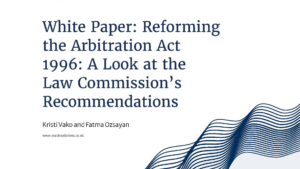Steer clear of a claim
Have you got a question?
Wrongful dismissal is a dismissal in breach of contract and wrongful dismissal claims can be brought in the courts as well as the employment tribunal. Fairness is not an issue: the sole question is whether the terms of the contract, which can be written or implied, have been breached. The employee will have a claim for damages if the employer, in dismissing them, breached the contract and caused them (financial) loss. A wrongful dismissal claim may arise out of an actual or constructive dismissal. Constructive dismissal is where an employee resigns in response to an alleged serious breach of contract by the employer.
This is in contrast to unfair dismissal. Where wrongful dismissal is based on the employment contract, unfair dismissal is defined by law. An unfair dismissal claim has several preconditions, including a qualifying period of employment (two years, in most cases); and the employer can only rely on what they knew at the time of the dismissal. Wrongful dismissal does not have a qualifying period and if an employer discovers evidence of (serious) misconduct after dismissal, they can use that evidence to defend the claim.
Examples of breaches of contract dcited in wrongful dismissal claims include:
- Breach of a contract term specifying the period of notice or the minimum notice period required by law.
- Termination of a fixed-term contract or a “specific task” (or project) contract before the expiry date or before the specified task is completed.
- Failure to keep to the contractual disciplinary or redundancy procedure.
Of the three, the most common reason is the first one. However, if the employment contract has a “payment in lieu of notice” clause (sometimes called a PILON clause), no notice is required provided that the payment is made. If the employee committed a repudiatory (i.e. very serious) breach of the contract, then the contract may allow the employer to dismiss without notice. If the employee contests whether the alleged level of misconduct is sufficiently high to breach the contract, that will be a question of fact for the court or tribunal.
It is important to note that wrongful dismissal may free the employee from any post-termination restriction covenants.
It is important to note that a wrongful dismissal may free the employee from any post-termination restriction covenants (sometimes framed as ‘non-compete clauses’). These restrictions include preventing an employee from poaching staff or clients, or from working in competition for a specified period within a specified geographical area. This is because the employer broke the contract first by dismissing the employee in breach of (for example) the notice clauses. The employee can arguably consider themselves free from any further requirements to keep to their contractual obligations.
If an employer is intending to dismiss an employee, the best way to avoid wrongful dismissal claims is to first carefully read the employee’s contract to see if there are any clauses that cover notice periods, minimum length of contract or specific tasks that need completion. Notice period clauses may also have a PILON clause (in which case the notice period simply needs to be per the PILON clause).
If a specific task requires completion and has not yet been completed, check whether there is any flexibility in cancelling the contract (for example, poor performance or not reaching contractually required stages of the task). If there is any contractual dismissal procedure, or if you have a dismissal policy, be sure to follow it.
Book a call back
Share this article
Got a question?
Please complete this form to send an enquiry. Your message will be sent to one member of our team.
Related posts

Reforming the Arbitration Act 1996: A Look at the Law Commission’s Recommendations
Have you got a question? Enquire Now Kristi Vako and Fatma Ozsayan have looked at the new recommendations published by the Law Commission.

Artificial Intelligence and its Future Impact on Employment Law
Artificial Intelligence (AI) is rapidly transforming various aspects of our lives, and one area where its impact is becoming increasingly significant is in the realm of employment law.

The digitation of the Italian public procurement lifecycle: Artificial Intelligence application in procurement from January
A definitive law for oncological oblivion, namely the opportunity for individuals who have recovered from an oncological condition to erase the ‘bureaucratic’ negative effects that the disease still imposes on employment searches, adoptions, mortgage applications, or insurance subscriptions.

Whistleblowing and its implementation in the UK, Germany, and Italy
Have you got a question? Enquire Now Our white paper on whistleblowing provides a comprehensive overview of the EU Whistleblowing Directive, its implementation


